

Head of legal and compliance Asia Pacific North | SIG Group



Kenneth Zhou
Head of legal and compliance Asia Pacific North | SIG Group
How do you approach managing legal aspects during periods of instability or crises to ensure the organisation’s resilience?
I adopt a systematic approach by identifying risks and developing a legal framework tailored to the organization’s main risks. I prioritize allocating resources to manage high-risk areas such as anti-trust, anti-bribery and anti-corruption, data privacy and personal information protection, and trade compliance.
I focus on developing my team members within the legal and compliance department, aligning their expertise with their experience and interests, and providing specialized training to become experts in specific legal areas.
I build trust with global and regional executives, fostering strong relationships to ensure the allocation of both external and internal resources to effectively manage legal and compliance risks, even during times of economic downturn and complex geopolitical challenges.
What are the main projects that you have been involved in recently?
Amid the economic downturn, I successfully navigated intricate legal obstacles during the process of cross-provincial personnel relocations related to factory closures. This involved delicate negotiations surrounding mass layoffs, particularly addressing sensitive issues such as work-related injuries, occupational diseases, long-term labor dispatch, and terminations of employees who are about to retire. Despite the complexities, we achieved exceptional results, with over 99% of employees reaching mutual severance agreements through negotiations.
I also led the real property sale project for the Shanghai factory, taking charge of various aspects such as selecting potential buyers, making strategic decisions on negotiation tactics, determining the most viable transaction structure, and negotiating the real property sale agreement. I have made significant progress this year despite the inactive market in Shanghai and the substantial challenges posed by the general economic downturn.
What are some of the main trends impacting the industry sector you work in in China?
In the industry sector in which we operate in China, several key trends are having a significant impact.
Localisation has become a key focus, with companies placing greater emphasis on localising human resources and other resources to adapt more effectively to the fast-evolving market conditions and competitive landscape in China.
Cost reduction is another important trend. To thrive in such a competitive environment, businesses are shifting away from high-margin strategies and focusing on reducing costs and improving efficiency.
In addition, companies are placing increasing importance on agility in response to rapidly changing market dynamics. Adapting quickly to customer demands, market trends, and technological advancements has become a priority.
Finally, mergers and acquisitions are gaining momentum, with Chinese companies engaging in M&A activities to bolster their competitive positions against multinational corporations.
These trends collectively highlight the evolving nature of the industry in China, as companies seek to stay competitive while navigating the dynamic market conditions and reshaping the industry landscape.
These trends reflect the evolving nature of the industry in China, where companies are striving to maintain a competitive edge and navigate the rapidly changing market environment.
What is a topic (business-related or otherwise) that you are passionate about, and why?
Anti-trust law has always been a particularly compelling area of legal practice for me, especially given my involvement in handling the first dawn raid case in mainland China concerning abuse of a dominant market position. Additionally, I have had the opportunity to lead anti-trust filings for cross-border mergers and acquisitions projects in Asia as the chief counsel.
I am also deeply passionate about comprehensive compliance, which covers a broad range of areas such as anti-bribery and anti-corruption, trade compliance, data protection, intellectual property rights protection, and labour compliance. I firmly believe that addressing these areas is critical, as they pose both actual and potential risks for the company. My work and expertise in these areas contribute to creating substantial value, supporting the sound and sustainable development of the organisation.
Head of legal and compliance Asia Pacific North | SIG Group